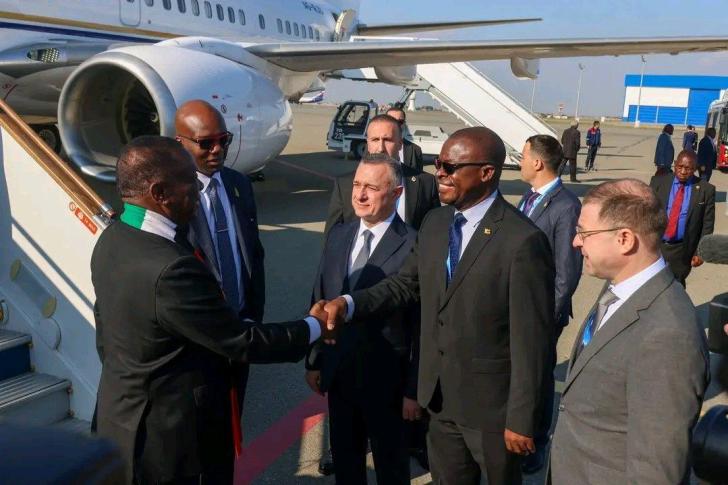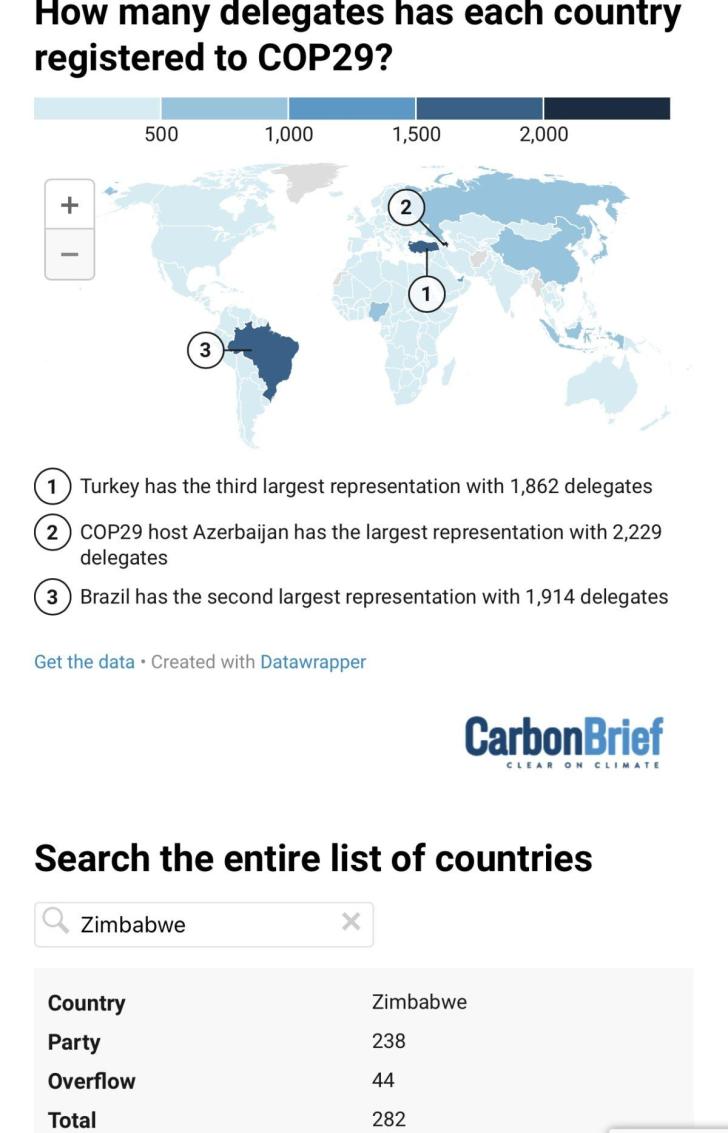News / National
Mnangagwa takes 238 people to UN climate summit
14 Nov 2024 at 13:19hrs |
0 Views

Zimbabwe's President Emmerson Mnangagwa has drawn scrutiny after bringing a delegation of 238 people to the United Nations Climate Change Conference (COP29) in Baku, Azerbaijan. According to data from the conference organizers, this is one of the largest delegations among attending nations. Additionally, 44 other Zimbabweans are registered under a special "Overflow" category, covering their own expenses while in Azerbaijan.
The sheer size of Zimbabwe's delegation starkly contrasts with that of other nations. South Africa, with a population of 60 million, has only 51 representatives; Mozambique, with 78; Botswana, with 39; and even France is represented by just 63 delegates. This comes at a time when Zimbabwe faces a severe drought, its worst in 40 years, with over half of its population urgently in need of food aid.
Funding the delegation is expected to strain Zimbabwe's limited financial resources. Each government delegate is receiving a daily allowance of US$1,000 for the five-day conference, totaling US$1.2 million. Mnangagwa himself left Harare on a chartered private Boeing 737-700 BBJ, leased from Dubai-based Royal Jet Services. The luxury aircraft, with VIP and business-class configurations and a bedroom, costs approximately US$12,700 per hour to operate. The round trip between Harare and Baku is estimated to cost taxpayers around US$200,000, not including empty leg flights between Dubai and Harare.
In total, the trip is projected to cost close to US$2 million - an amount which could provide substantial relief to thousands of food-insecure Zimbabweans back home. The expense is causing public outcry over government spending priorities at a time of acute economic hardship.

Addressing the summit on Tuesday, Mnangagwa highlighted the urgency of climate action, declaring, "The time for half measures is over, and we all have a duty to implement our agreements." His call aligns with a unified African position at COP29, where leaders are pushing for climate finance reform and sustainable development support.
A key agenda at COP29 is establishing the New Collective Quantified Goal (NCQG) on climate finance, which will replace the 2009 target of mobilizing $100 billion annually for climate action in developing countries. The negotiations have been contentious, with debates over the fund's scale, contributions, and management.
Mnangagwa's large delegation to COP29, while intended to underscore Zimbabwe's commitment to climate issues, has drawn significant criticism domestically as citizens question the government's spending priorities amid a growing hunger crisis.
The sheer size of Zimbabwe's delegation starkly contrasts with that of other nations. South Africa, with a population of 60 million, has only 51 representatives; Mozambique, with 78; Botswana, with 39; and even France is represented by just 63 delegates. This comes at a time when Zimbabwe faces a severe drought, its worst in 40 years, with over half of its population urgently in need of food aid.
Funding the delegation is expected to strain Zimbabwe's limited financial resources. Each government delegate is receiving a daily allowance of US$1,000 for the five-day conference, totaling US$1.2 million. Mnangagwa himself left Harare on a chartered private Boeing 737-700 BBJ, leased from Dubai-based Royal Jet Services. The luxury aircraft, with VIP and business-class configurations and a bedroom, costs approximately US$12,700 per hour to operate. The round trip between Harare and Baku is estimated to cost taxpayers around US$200,000, not including empty leg flights between Dubai and Harare.
In total, the trip is projected to cost close to US$2 million - an amount which could provide substantial relief to thousands of food-insecure Zimbabweans back home. The expense is causing public outcry over government spending priorities at a time of acute economic hardship.

Addressing the summit on Tuesday, Mnangagwa highlighted the urgency of climate action, declaring, "The time for half measures is over, and we all have a duty to implement our agreements." His call aligns with a unified African position at COP29, where leaders are pushing for climate finance reform and sustainable development support.
A key agenda at COP29 is establishing the New Collective Quantified Goal (NCQG) on climate finance, which will replace the 2009 target of mobilizing $100 billion annually for climate action in developing countries. The negotiations have been contentious, with debates over the fund's scale, contributions, and management.
Mnangagwa's large delegation to COP29, while intended to underscore Zimbabwe's commitment to climate issues, has drawn significant criticism domestically as citizens question the government's spending priorities amid a growing hunger crisis.
Source - zimlive
Join the discussion
Loading comments…
































